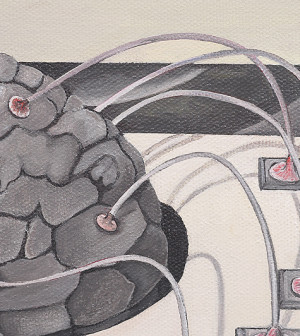- 8 Ways to Increase Dopamine Naturally
- 7 Best Breads for Maintaining Stable Blood Sugar
- Gelatin vs. Collagen: Which is Best for Skin, Nails, and Joints?
- The Long-Term Effects of Daily Turmeric Supplements on Liver Health
- Could Your Grocery Store Meat Be Causing Recurring UTIs?
- Are You Making This Expensive Thermostat Error This Winter?
- Recognizing the Signs of Hypothyroidism
- 10 Strategies to Overcome Insomnia
- Could Artificial Sweeteners Be Aging the Brain Faster?
- Techniques for Soothing Your Nervous System
Scans Suggest Recurrent Depression May Take Toll on the Brain


The area of the brain involved in forming new memories, known as the hippocampus, seems to shrink in people with recurring depression, a new study shows.
Australian researchers say the findings highlight the need to spot and treat depression when it first develops, particularly among young people.
Ian Hickie, who co-directs the Brain and Mind Research Institute at the University of Sydney, led the study. His team looked at the neurology of almost 9,000 people from the United States, Europe and Australia. To do so, they analyzed brain scans and medical data for about 1,700 people with major depression, and almost 7,200 people who didn’t suffer from depression.
The researchers noted that 65 percent of the participants with major depression had suffered recurring symptoms.
The study, published June 30 in the journal Molecular Psychiatry, found that people with major depression, particularly recurring forms of the condition, had a smaller hippocampus. This part of the brain was also smaller among participants diagnosed with depression before they reached the age of 21.
Many young people diagnosed with depression go on to develop recurring symptoms, Hickie’s team noted.
Recurrence seemed key: About a third of participants had had only one episode of major depression, and they did not show any reduction in the size of their hippocampus compared to non-depressed people.
According to the researchers, that suggests that it is recurring depression that takes a toll on brain anatomy.
The take-home message: Get depression diagnosed and treated before brain changes can occur, the Australian team said.
“This large study confirms the need to treat first episodes of depression effectively, particularly in teenagers and young adults, to prevent the brain changes that accompany recurrent depression,” Hickie said in a university news release.
According to co-researcher Jim Lagopoulos, “these findings shed new light on brain structures and possible mechanisms responsible for depression.”
“Despite intensive research aimed at identifying brain structures linked to depression in recent decades, our understanding of what causes depression is still rudimentary,” Lagopoulos, who is an associate professor at the institute, said in the news release.
The study couldn’t prove cause-and-effect, however, and the study authors say that more research could help explain if the brain changes are the result of chronic stress, or if these changes could help spot people who are more vulnerable to depression.
More information
The U.S. National Institute of Mental Health provides more information on depression.
Source: HealthDay
Copyright © 2026 HealthDay. All rights reserved.










